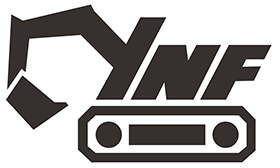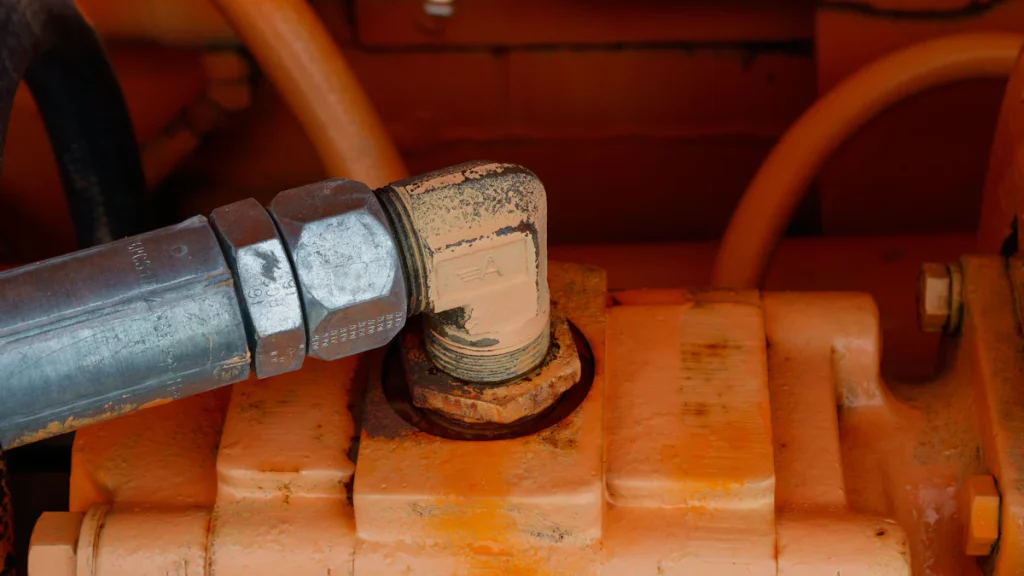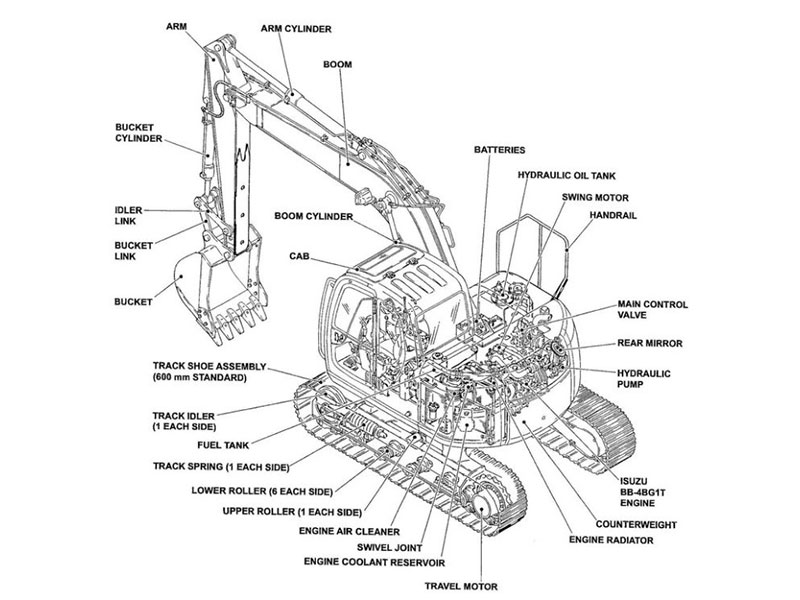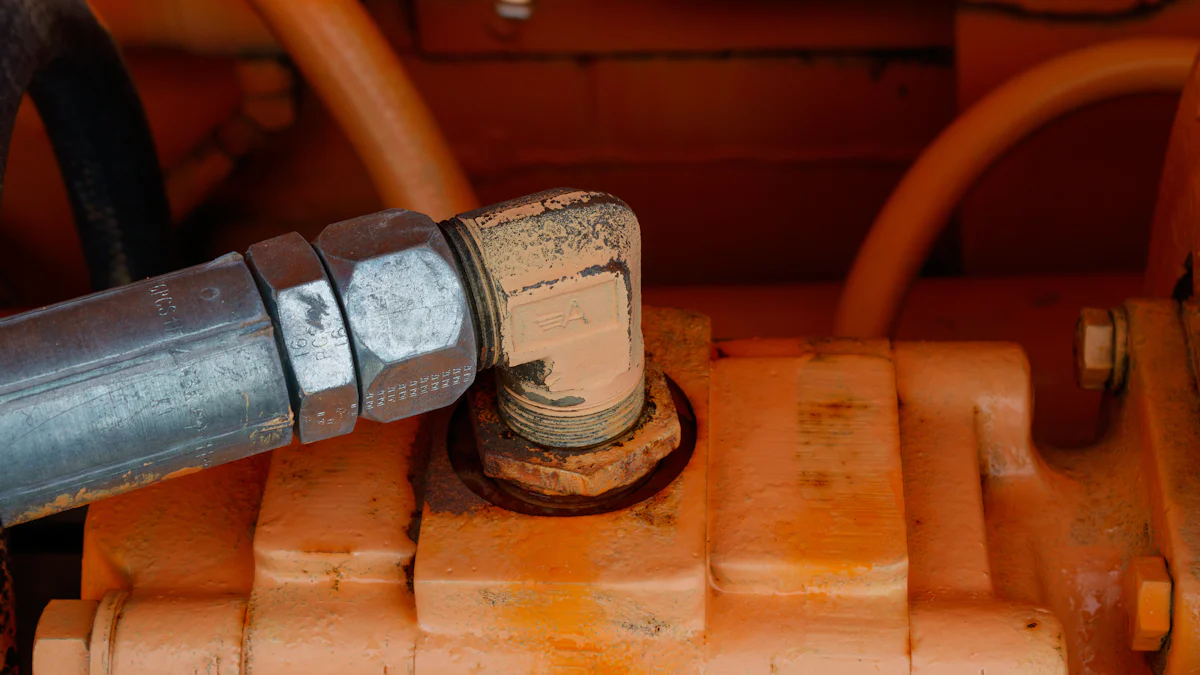
Hydraulic pump excavator parts serve as the essential component of an excavator’s hydraulic system. These parts convert mechanical energy into hydraulic power, enabling the machine to perform its primary functions with precision. You rely on these excavator components for tasks like digging trenches, excavating foundations, and lifting heavy materials. Hydraulic systems also allow excavator equipment to demolish structures, level land, and load materials efficiently. Their durability ensures consistent performance, making them vital for heavy-duty operations. Understanding their roles helps you maintain the machine’s functionality and extend its lifespan.
Key Takeaways
Hydraulic pump excavator parts change mechanical energy into hydraulic power. This helps with digging, lifting, and moving materials easily.
Taking care of hydraulic systems, like fixing leaks and changing filters, makes excavator parts last longer.
Picking the right hydraulic pump—gear, piston, or vane—depends on the job and pressure needs.
Good-quality hydraulic parts, like seals and couplings, stop leaks. They keep the machine running smoothly and save time and money.
Knowing how hydraulic parts work helps you keep your excavator working well and ready for different tasks.
Overview of Hydraulic Pump Systems in Excavators
What Is an Excavator Hydraulic Pump System?
An excavator hydraulic pump system is the core of your excavator’s hydraulic operations. It transforms mechanical energy into hydraulic energy, enabling the machine to perform heavy-duty tasks. This system consists of several key components:
Reservoir: Stores hydraulic oil and prevents contamination.
Pump: Converts mechanical energy into hydraulic energy.
Valves: Direct the flow of hydraulic oil.
Actuator: Converts fluid pressure into mechanical force for lifting.
Pressure Regulator: Maintains consistent hydraulic fluid pressure.
These components work together to ensure your excavator operates efficiently, even under challenging conditions.
How Hydraulic Systems Power Excavators
Hydraulic systems power excavators by generating high force outputs without being limited by physical distance. Unlike traditional systems that rely on cylinders, hydraulic systems use fluid pressure to achieve greater power. The hydraulic pump displaces fluid, creating pressure that drives the machine’s movements. This process allows your excavator to lift heavy loads, dig deep trenches, and perform precise operations. The ability to generate immense force makes hydraulic systems ideal for heavy machinery like excavators.
Types of Excavator Hydraulic Pumps (Gear, Piston, Vane)
Excavator hydraulic pumps come in three main types, each designed for specific applications:
Gear Pumps: These pumps use interlocking gears to move fluid. They are simple, reliable, and suitable for low-pressure tasks.
Piston Pumps: These pumps use a reciprocating piston to create high pressure. They are ideal for demanding applications requiring precision and power.
Vane Pumps: These pumps provide a steady flow of fluid. They are easy to maintain and work well in moderate-pressure systems.
Each type of pump operates by displacing fluid to generate the pressure needed for your excavator’s hydraulic system. Choosing the right pump depends on your machine’s requirements and the tasks you need to perform.
Main Parts of an Excavator Hydraulic Pump System
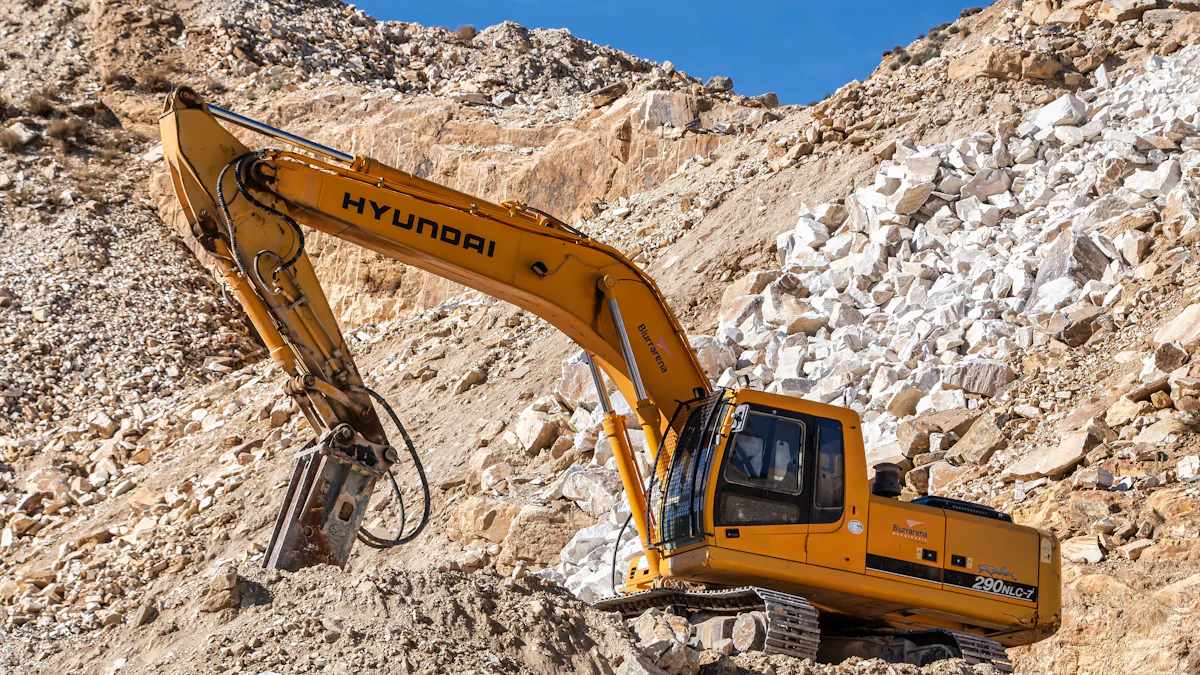
Hydraulic Pump
Function and Importance of the Hydraulic Pump
The hydraulic pump is the heart of your excavator’s hydraulic system. It converts mechanical energy from the engine into hydraulic energy, creating the pressure needed to move fluid through the system. This pressure powers the actuators, enabling the machine to perform tasks like digging, lifting, and rotating. Without a functioning hydraulic pump, your excavator cannot operate efficiently.
The pump plays a critical role in generating hydraulic pressure for various circuits. For example:
The bucket circuit controls the bucket’s movement, essential for digging and material handling.
The boom circuit allows vertical movement, crucial for excavation.
The dipper arm circuit manages digging depth.
The slewing circuit enables 360-degree rotation, enhancing versatility.
Types of Hydraulic Pumps and Their Applications
Excavator hydraulic pumps come in three main types, each suited for specific tasks:
Gear Pumps: These pumps are simple and reliable, making them ideal for low-pressure applications.
Piston Pumps: Known for their precision and power, these pumps handle high-pressure tasks like lifting heavy loads.
Vane Pumps: These pumps provide a steady flow of fluid, suitable for moderate-pressure systems.
Each type of pump includes essential hydraulic pump parts like vanes, rotors, and ports. These components ensure fluid movement and prevent leaks, maintaining the system’s performance.
Hydraulic Valves
Role of Valves in Controlling Fluid Flow
Hydraulic valves regulate the flow of fluid within your excavator’s hydraulic system. They act as control points, directing hydraulic pressure to specific components. For instance, the pilot valve, operated by you, manages the main valve, which then controls fluid flow to the actuators. This precise regulation ensures smooth operation and prevents system overload.
Types of Valves (Directional, Pressure, Flow Control)
Hydraulic valves come in three main types:
Directional Valves: These valves control the path of fluid flow, determining which actuator receives pressure.
Pressure Valves: These maintain consistent hydraulic pressure, protecting the system from damage.
Flow Control Valves: These regulate the speed of fluid flow, ensuring smooth and efficient operation.
Each valve type plays a vital role in optimizing your excavator’s hydraulic system.
Hydraulic Cylinders
How Cylinders Convert Hydraulic Energy into Mechanical Force
Hydraulic cylinders are mechanical actuators that transform hydraulic energy into linear motion and force. When pressurized fluid enters the cylinder, it pushes the piston, creating movement. This process powers the boom, arm, and bucket, enabling precise digging and lifting.
Applications of Hydraulic Cylinders in Excavators
Hydraulic cylinders are essential for various excavator functions. They control the boom, arm, and bucket movements, allowing you to dig trenches, lift heavy materials, and position objects like sewer pipes or building panels. These cylinders ensure your excavator performs efficiently across multiple applications.
Hydraulic Hoses and Fittings
Importance of Hoses in Fluid Transmission
Hydraulic hoses play a critical role in transmitting fluid throughout your excavator’s hydraulic system. These hoses connect various hydraulic pump parts, ensuring smooth fluid flow between components like pumps, valves, and actuators. Without reliable hoses, your excavator cannot perform essential tasks like digging or lifting.
The materials used in hydraulic hoses determine their durability and efficiency. Common materials include:
Synthetic Rubber: Offers flexibility and resistance to abrasions and high temperatures.
Thermoplastics: Lightweight and chemical-resistant, suitable for low-pressure applications.
Teflon (PTFE): Withstands extreme temperatures and harsh chemicals, ideal for demanding environments.
Stainless Steel: Handles extreme conditions, including high pressure and corrosive environments.
Selecting the right hose material ensures your hydraulic system operates efficiently, even in tough conditions.
How Fittings Ensure Leak-Free Connections
Hydraulic fittings secure the connections between hoses and other hydraulic pump parts, preventing leaks and maintaining system pressure. Properly chosen fittings ensure your excavator operates without interruptions.
When selecting fittings, consider these factors:
Fluid Type: Ensure compatibility with the hydraulic fluid used in your system.
System Pressure Requirements: Match fittings to the system’s pressure rating to avoid failures.
Pipe and Hose Specifications: Choose fittings that fit the diameter and wall thickness of your hoses.
Environmental Conditions: Use fittings rated for temperature extremes and chemical exposure.
Leak-free connections depend on high-quality fittings that align with your system’s specifications.
Hydraulic Filters
Role of Filters in Maintaining Fluid Cleanliness
Hydraulic filters remove impurities from the fluid, ensuring your excavator’s hydraulic system operates efficiently. Clean fluid reduces wear on hydraulic pump parts, extending their lifespan. Regular inspections of filters help maintain system reliability and prevent costly repairs.
Filters work by trapping contaminants like dirt and moisture, which can damage parts of an excavator. Clean hydraulic fluid ensures smooth operation, reducing the risk of system failures.
Impact of Contaminated Fluid on System Performance
Contaminated hydraulic fluid can severely impact your excavator’s performance. Dirt and water accelerate wear on hydraulic pump parts, leading to frequent breakdowns. Contaminants clog valves, causing sluggish or erratic movements. Damaged seals and gaskets result in leaks, reducing system pressure and efficiency.
Using clean fluid minimizes maintenance costs and extends the lifespan of hydraulic components. Regularly replacing filters ensures your excavator performs at its best, avoiding downtime and expensive repairs.
The Role of YNF Machinery in Supplying Hydraulic Pump Excavator Parts
YNF Machinery’s Hydraulic Oil Seals
How Hydraulic Oil Seals Prevent Leaks and Enhance Efficiency
Hydraulic oil seals play a vital role in maintaining the efficiency of your excavator hydraulic pump system. These seals prevent fluid leaks, ensuring the hydraulic system operates smoothly. YNF Machinery offers high-quality hydraulic pump parts, including oil seals made from durable materials like nitrile rubber and polyurethane. These seals withstand extreme temperatures and pressures, making them ideal for heavy-duty applications.
By using YNF Machinery’s hydraulic oil seals, you can protect your excavator from contamination and wear. The seals create a tight barrier, preventing dirt and moisture from entering the system. This protection reduces the risk of damage to hydraulic pump parts, extending the lifespan of your equipment. With these seals, you can maintain consistent performance and avoid costly repairs.
YNF Machinery’s Excavator Couplings
Ensuring Smooth Power Transmission with High-Quality Couplings
Excavator couplings are essential for connecting the engine to the hydraulic pump. They ensure smooth power transmission, enabling your excavator to perform demanding tasks. YNF Machinery provides a wide range of couplings designed for durability and efficiency. These couplings compensate for misalignment and reduce vibrations, protecting the hydraulic pump system from damage.
YNF Machinery’s couplings are easy to install and maintain. Their robust construction ensures reliable performance, even in harsh conditions. By choosing these high-quality hydraulic pump parts, you can minimize downtime and maximize productivity. Whether you need couplings for lifting, digging, or material handling, YNF Machinery has you covered.
YNF Machinery’s Excavator Engine Parts
Supporting Engine Performance for Optimal Hydraulic Operation
The engine powers your excavator hydraulic pump system, making engine parts critical for efficient operation. YNF Machinery offers a comprehensive selection of engine parts, including pistons, crankshafts, and fuel pumps. These parts are designed to meet or exceed OEM standards, ensuring compatibility and reliability.
Using YNF Machinery’s engine parts helps you maintain optimal hydraulic performance. High-quality components reduce fuel consumption and emissions, lowering operating costs. Regular maintenance with these parts ensures your excavator operates smoothly, even under heavy workloads. With YNF Machinery, you can keep your hydraulic pump system running at peak efficiency.
YNF Machinery’s Hydraulic Cylinder Seal Kits
Preventing Oil Leaks and Extending Cylinder Lifespan
Hydraulic cylinder seal kits play a crucial role in maintaining your excavator’s performance. These kits prevent oil leaks, ensuring the hydraulic system operates efficiently. Without proper seals, oil leakage can reduce pressure in the system, leading to poor performance and potential damage to components. YNF Machinery’s hydraulic cylinder seal kits provide a reliable solution to this problem.
These seal kits are made from high-quality materials like NBR and FKM, which resist wear and tear. They create a tight seal between the cylinder and its moving parts, preventing oil from escaping. This ensures that the hydraulic system maintains consistent pressure, allowing your excavator to perform heavy-duty tasks like digging and lifting. By using these kits, you can avoid frequent repairs and extend the lifespan of your hydraulic cylinders.
You’ll find these seal kits especially useful in harsh working environments. They withstand extreme temperatures, shocks, and vibrations, making them ideal for construction and mining applications. Their precise design ensures a perfect fit, reducing the risk of misalignment and further damage. Regularly replacing worn-out seals with YNF Machinery’s kits helps you maintain the efficiency of your hydraulic pump system.
When you invest in these seal kits, you protect your excavator from costly downtime. Clean hydraulic fluid and properly sealed cylinders ensure smooth operation. This not only improves performance but also reduces maintenance costs. YNF Machinery’s seal kits offer a cost-effective way to keep your equipment running at its best.
Tip: Inspect your hydraulic cylinders regularly for signs of wear or leaks. Early detection can save you time and money.
Importance of Maintenance for Excavator Hydraulic Pumps and Parts
Preventing Wear and Tear
Wear and tear in hydraulic pump parts can lead to costly repairs and downtime. Regular maintenance helps you identify potential issues early, preventing severe damage. Common causes of wear include contamination, inadequate lubrication, and improper fluid levels. For example:
Type of Wear | Description | Causes and Prevention |
|---|---|---|
Adhesive Wear | Occurs when surfaces lose lubrication, leading to scuffing and heat generation. | Keep hydraulic fluid clean and ensure proper lubrication. |
Fatigue Wear | Manifests as cracking and material loss, especially in bearings and gears. | Minimize unnecessary shock loading on the system. |
Cavitation Wear | Results from collapsing bubbles that erode metal surfaces. | Avoid conditions that lead to bubble formation at pump inlets. |
Erosive Wear | Caused by hard particles contaminating hydraulic fluid, leading to erosion. | Prevent particulate contamination and regularly check filters. |
Corrosive Wear | Results from chemical reactions, such as rusting or acid formation. | Regularly change hydraulic fluid and monitor for contamination by water or heat degradation. |
By addressing these issues, you can ensure your hydraulic system operates efficiently and avoid unnecessary wear on parts of an excavator.
Extending the Lifespan of Hydraulic Components
Proper maintenance extends the lifespan of hydraulic pump parts and ensures your excavator performs at its best. Regular inspections allow you to detect leaks, cracks, or worn-out components before they cause significant problems. Keeping hydraulic fluids clean and replacing them as needed prevents contamination, which can damage critical parts. Additionally, inspecting hoses and fittings for leaks ensures the hydraulic system maintains consistent pressure.
To maximize the lifespan of your excavator tracks and other components:
Schedule maintenance based on usage and manufacturer recommendations.
Train operators to follow proper procedures, reducing the risk of damage.
Monitor system pressure to detect abnormalities and make timely adjustments.
These practices help you maintain the reliability and efficiency of your hydraulic system.
Tips for Regular Maintenance
Checking for Leaks and Damage
Inspect your hydraulic pump parts regularly for leaks, cracks, or other signs of damage. Pay close attention to hoses, fittings, and seals, as these are common areas where leaks occur. Early detection of issues prevents further damage and reduces downtime.
Replacing Filters and Fluids
Hydraulic filters remove impurities that can harm your system. Replace filters according to the manufacturer’s guidelines to maintain fluid cleanliness. Also, check fluid levels and replace hydraulic fluids as needed to ensure proper lubrication and prevent contamination.
Monitoring System Pressure and Performance
Monitor the pressure levels, flow rates, and temperature of your hydraulic system. Keeping these parameters within recommended ranges ensures optimal performance. If you notice any abnormalities, address them immediately to avoid major issues.
Tip: Cleanliness is crucial during maintenance. Dirt and water can contaminate hydraulic fluids, leading to wear and environmental risks. Always follow stringent cleanliness protocols.
By following these maintenance tips, you can keep your excavator tracks and hydraulic pump parts in excellent condition, ensuring smooth operation and reducing costs.
How Hydraulic Pump Excavator Parts Enhance Efficiency
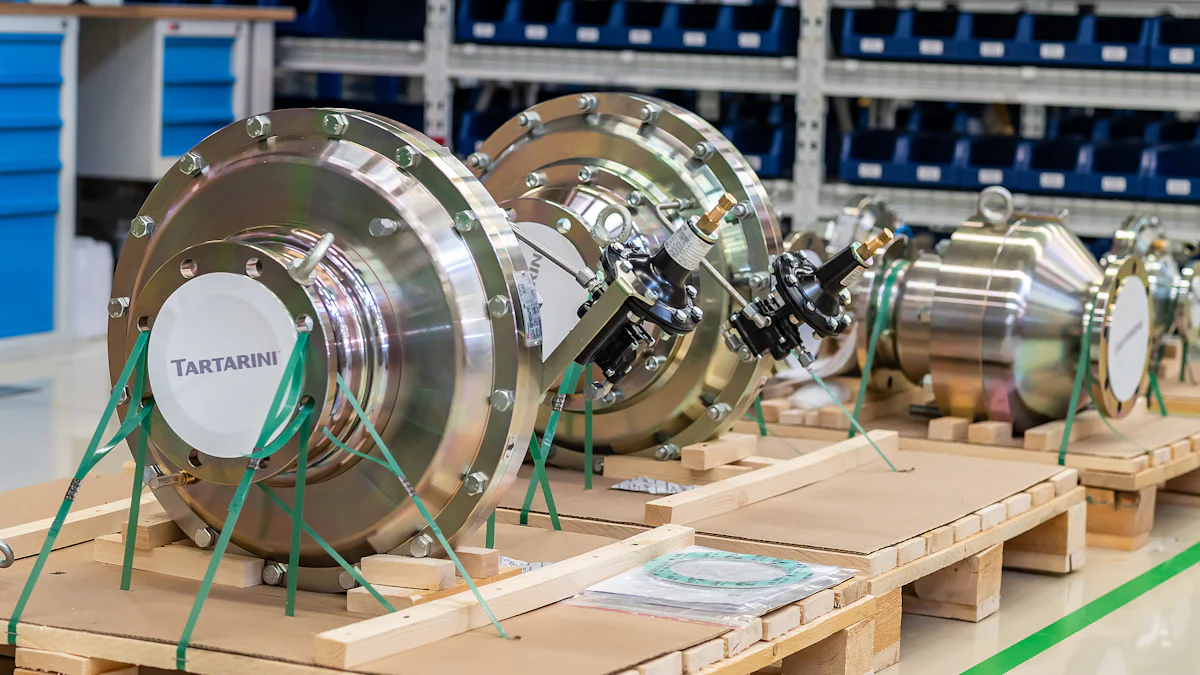
Improving Power and Precision in Excavator Operations
Hydraulic pump parts play a critical role in boosting the power and precision of your excavator. Regularly checking hydraulic fluid prevents contamination, ensuring smooth operation. Periodic inspections of components like pumps and valves help you identify leaks or wear early, maintaining optimal performance. Advanced hydraulic control systems, such as digitally controlled pumps (DDPs), take precision to the next level. These pumps feature embedded computers that allow you to control each outlet individually. By optimizing flow and pressure, they deliver faster response times and greater accuracy compared to traditional systems.
Operator training also enhances system performance. When operators understand how to use hydraulic systems effectively, they can adjust flow rates and equipment settings to match specific tasks. This reduces energy waste and improves the overall efficiency of your excavator. With these measures, you can achieve better control and maximize the power of your machine.
Reducing Downtime and Operational Costs
High-quality hydraulic parts reduce downtime and operational costs by ensuring reliable performance. Durable components, such as hoses, seals, and couplings, minimize the risk of breakdowns. Fewer failures mean your excavator spends more time in operation and less time in repair. Investing in premium parts also extends the service life of your hydraulic system, reducing the frequency of maintenance.
For example, using robust hydraulic seals prevents leaks that could lower system pressure and disrupt performance. Reliable parts also reduce wear on other components, saving you money on replacements. By maintaining system efficiency, you can lower fuel consumption and cut operational costs over time.
Supporting Versatility in Excavator Applications
Hydraulic pump systems enhance the versatility of your excavator, enabling it to perform a wide range of tasks. These systems power essential components like the boom, arm, and bucket, allowing you to dig, lift, and move materials with ease. They also drive the tracks or wheels, ensuring smooth mobility across different terrains.
Excavators equipped with advanced hydraulic systems excel in various industries. In construction, they lift and place heavy objects like sewer pipes. In mining, they dig and transport materials efficiently. Even in agriculture, they assist with land preparation and crop management. This versatility makes hydraulic systems indispensable for heavy machinery.
Application Field | Description |
|---|---|
Construction | Lifting and moving heavy materials. |
Mining | Digging and transporting materials. |
Agriculture | Land preparation and crop management. |
By leveraging the power of hydraulic systems, you can adapt your excavator to meet the demands of diverse applications.
Hydraulic pump excavator parts are essential for powering heavy machinery with precision and efficiency. The hydraulic pump converts mechanical energy into hydraulic energy, ensuring smooth fluid movement and optimal system performance. Components like vanes, rotors, and ports work together to prevent leaks and maintain proper fluid flow. Using high-quality parts enhances durability, ensures compatibility with various models, and provides precise control for excavator operations.
YNF Machinery offers reliable hydraulic solutions, including oil seals, couplings, engine parts, and cylinder seal kits. These products ensure efficient performance and reduce downtime. Regular maintenance, such as replacing filters and inspecting for leaks, extends the lifespan of your excavator hydraulic pump and its parts. By understanding these components, you can maximize your machine’s efficiency and minimize costs.
Tip: Invest in high-quality hydraulic parts to ensure long-term durability and smooth operation under heavy use.
FAQ
What are the signs of a failing hydraulic pump in an excavator?
Look for reduced power, unusual noises, or slow response times. Leaks around the pump or overheating can also indicate issues. Regular inspections help you catch these signs early.
How often should you replace hydraulic filters?
Replace hydraulic filters every 500 to 1,000 operating hours. Check your excavator’s manual for specific recommendations. Clean filters ensure smooth operation and prevent contamination.
Can you use any hydraulic fluid in your excavator?
No, always use the hydraulic fluid specified by the manufacturer. Using the wrong fluid can damage components and reduce efficiency. Check the manual for compatibility.
Why is it important to inspect hydraulic hoses regularly?
Regular inspections prevent leaks and failures. Damaged hoses can disrupt fluid flow, reducing system performance. Replace worn hoses immediately to avoid costly repairs.
How do hydraulic oil seals improve system efficiency?
Hydraulic oil seals prevent fluid leaks and contamination. They maintain consistent pressure, ensuring smooth operation. High-quality seals from YNF Machinery enhance durability and reduce maintenance costs.
Tip: Always follow the manufacturer’s maintenance schedule to keep your hydraulic system in top condition.
